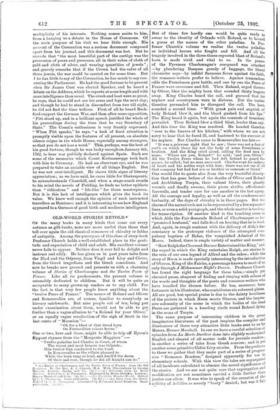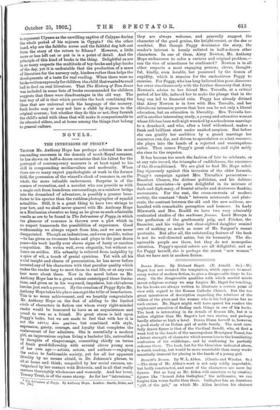OLD-WORLD STORIES RETOLD.* OF the many books in many kinds
that come out every autumn as gift-books, none are more useful than those that
tell over again the old classical romances of chivalry or fables of antiquity. Among the purveyors of this class of story-book
Professor Church holds a well-established place in the grati- tude and expectation of child and adult. His excellent volume never fails to appear. Neither does it ever fail to delight and instruct and edify. He has given us in past years tales from the Iliad and the Odyssey, from Virgil and Livy and Cicero,
from the Greek tragedians and the Greek comedians. And now be breaks new ground and presents us with a charming volume of Stories of Charlemagne and the Twelve Peers of France. Like all its predecessors, the present volume is ostensibly dedicated to children. But it will be quite as acceptable to many grown-up readers as to any child. For
the fact is that very few people know anything about the "twelve Peers of France." The names of Roland and Oliver
and Roncesvalles are, of course, familiar to everybody as literary catchwords. But nine people out of ten, being put under examination about them, would not be able to get
further than a vague allusion to "a Roland for your Oliver," or an equally vague recollection of the sigh of Scott in the last canto of " Marmion "—
" Oh for a blast of that dread horn
On Fontarabian echoes borne."
One or two, here and there, might be able to trip off Byron's flippant rhymes from the " Morgante Maggiore " :—
"Twelve paladins had Charles in Court, of whom
The wisest and most famous was Orlando; Him traitor Gan conducted to the tomb
In Roneesvalles as the villain planned to
While the horn rang so loud, and knell'd the doom Of their sad rout, though he did all Knight can do."
• (1.) Stories of Charlemagne and the Twelve Peers of Francs from the Old Romances. By the Bev. A. J. Church. M.A. With Illustrations by George Morrow. London Seeley and Co. [Ss. J-12.) Selections from La Morte Dart or. Edited by C. L. Thompson. Illustrated by Helen Stratton. London : Romeo Marshall and Sons. 1.8.61. j1.3.) The Celtic Wonder-World. Edited by C. L. Thompson. Same publishers. Is. 6d.1—(4.) Tales from the Greek. Eilized by C. L. Thompson. Illustrate: by Helen and Janet Stratton. Same publishers. , Is. But of these few hardly one would be quite ready to swear to the identity of Orlando with Roland, or to hazard a guess at the names of the other paladins. In pro. fessor Church's volume we realise the twelve paladins as individual heroes who fought and fell. And all the tragedy involved in the three-times-repeated blast of Roland's born is made vivid and vital to us. In the passes of the Pyrenees Charlemagne's rearguard was attacked —by plundering Basques greedy of baggage, the literal chronicler says—by infidel Saracens fierce against the faith, the romance-writers prefer to believe. Against tremendous odds the Frenchmen gave battle, and one by one the Peers of France were overcome and fell. Then Roland, urged thereto by Oliver, blew the mighty horn that sounded thirty leagues away. King Charles heard the call, and guessed that his nephew and countrymen were in distress. But the traitor Ganelon persuaded him to disregard the call. The horn sounded a second time. " With great pain and anguish of body Roland blew it, and the blood gushed from his lips." The King heard it again, but again the counsels of treachery prevailed. Then Roland blew a third blast, louder than any. And this time the King was resolved. He handed Ganelon " over to the knaves of his kitchen," with whom we are not sorry to hear that he fared ill, and hastened to the succour of his nephew. But Charles came to Roncesvalles too late:— " It was a grievous sight that he saw; there was not a foot of earth on which there lay not the body of some Frenchman or heathen. And the King cried aloud, calling the dead men by name. Where are you, Roland ? ' he said ; 'and you, Oliver?' All the Twelve Peers whom he had left behind to guard the passes, he called; but no man answered. Charles wept for sadness of heart and his nobles wept with him ; there was not one of all that company but had lost sou or brother or comrade or friend." One would like to quote also from the very beautiful descrip- tion that has gone before of the deaths of Oliver and Roland and Archbishop Turpin, their valiant blows, their ghastly wounds and deadly swoons, their pious shrifts, affectionate farewells, and tender care for one another in the last agony. All the courage and loyalty, as well as all the crudeness and barbarity, of the days of chivalry is in these pages. But the charm of the narrative is not to be represented by a few separated lines, or even a solid paragraph, and the whole matter is too long for transcription. Of another kind is the touching scene in which Alda the Fair demands Roland of Charlemagne as her "promised husband," and falls dead on hearing that he is dead_ And, again, in rough contrast with the delicacy of Aida's fine constancy is the grotesque violence of the attempted com- pulsory baptism of Balan, the vanquished Admiral of the Moors. Indeed, there is ample variety of matter and manner.
" How Ralph the C harcoal-Burner Entertained the King," and the sequel in which the King entertains Ralph, are stories in the vein of our own legend of Alfred and the cakes ; while the story of Huon is made specially interesting by the introduction of Oberon, King of the Fairies, a personage known to most of us only through A Midsummer Night's Dream. Professor Church has found the right language for these tales,—simple yet elevated prose, eloquent of feeling and ringing with echoes of the words and thoughts of the poets and romance-writers who have handled the themes before. He has, moreover, been fortunate in his illustrator, who contributes six coloured plates. All are good, but special praise is due to the dainty loveliness of the picture in which Huon meets Oberon, and the impres- sive solemnity of the scene in which the bodies of the dead Peers are gathered in a kneeling circle round Roland dying in the arms of Turpin. The same purpose of interesting children in the great imaginative literatures of the past inspires the compiler and illustrators of three very attractive little books sent to us by Messrs. Horace Marshall. In one we have a careful selection of episodes from La Merle Darthur done into slightly modernised English and cleared of all matter unfit for juvenile readers ;- in another a series of tales from Greek sources ; and in yet. another some primitive Celtic fairy-stories. From the prefaces to these we gather that they make part of a series of progres- sive " Romance Readers," designed apparently
for use in elementary schools. With this view the tales are expurgated of all incidents calculated to obscure the moral significance of the stories. And we are not quite sure that expurgation and modification are not sometimes carried a little further than •
justice can allow. It was wise to speak of the occasion of the sulking of Achilles as merely " booty " denied; but was it an to represent Ulysses as the unwilling captive of Calypso during the whole period of his sojourn in Ogygia P On the other hand, why are the faithful nurse and the faithful dog left out from the story of the return to Ithaca P However, a little more or less left out or put in is a point of detail. And the principle of this kind of books is the thing. Delightful as are in so many respects the multitude of toy-books and play-books of the day, yet it is undeniable that the production of a mass of literature for the nursery only, hinders rather than helps the developments of a taste for real reading. When there were no books written expressly for children the, child that wanted to read had to feed on real literature. That The History of Tom Jones was included in some lists of books recommended for children suggests that there were disadvantages in the old way. The best way of all is that which provides the book combining the ideas that are universal with the language of the nursery. Such books may or may not lure a child by degrees to the original sources ; but whether they do this or not, they furnish the child's mind with ideas that will make it companionable to its educated elders, and at home among the things that belong to general culture.











































 Previous page
Previous page